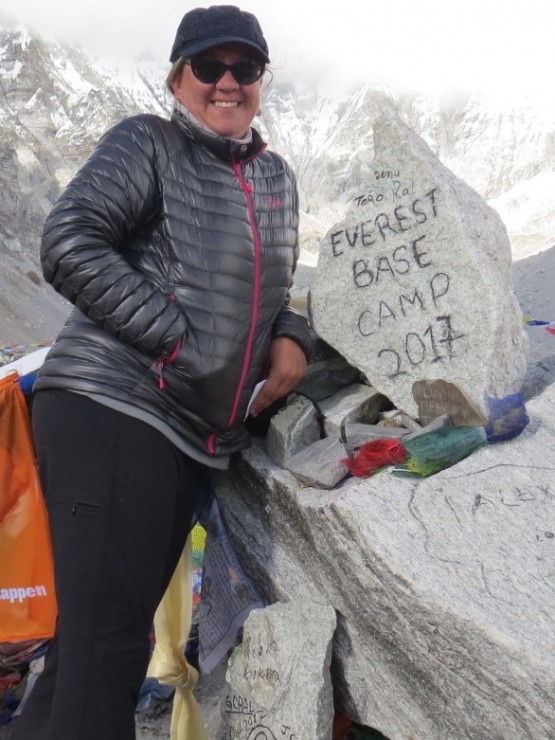Everest to End Duchenne
Tonya (Bakewell) Dreher ’92 knew she was made for something more when her son Gus was diagnosed with Duchenne muscular dystrophy.
Tonya (Bakewell) Dreher ’92
Major: English
After graduating from Concordia, Dreher was an English teacher for 12 years until her youngest was diagnosed with Duchenne. She soon realized that her life’s calling was perhaps a little different than she had planned.
Duchenne is a form of muscular dystrophy caused by an absence of dystrophin, a protein that helps keep muscle cells intact. More than 20 types of muscular dystrophy exist, with Duchenne being the most common but also the most severe. It’s a genetic disorder most often passed down to boys but can sometimes manifest in spontaneous mutation, which is what happened to Gus.

“When you exercise, your muscles hurt, they break down and then build back up stronger. But when those with muscular dystrophy break down their muscles, they don’t build them back up. They build scar tissue instead,” Dreher said.
They eventually lose the ability to walk and use their hands. If they live long enough, they need help breathing.
“It’s always terminal and it depends on how the disease progresses,” Dreher said. “Gus is 13 now and still walking, but he’s on a clinical trial. He falls a lot and uses a scooter for long distances.”
Dreher began brainstorming about ways to not only raise awareness but also funding for medical research.
“When we had Gus, we researched a lot about what Duchenne is and we found out that there are all these drugs sitting in labs all around the world that could be potential treatments, but they weren’t being funded because Duchenne isn’t big business in the pharmacy world,” Dreher said. “It’s not cancer. It’s not diabetes. That’s why we wanted to start Hope for Gus so we could fund some of this medical research.”
The Hope for Gus Foundation was Dreher’s leap of faith. She realized that more had to be done for her son and the thousands of other children affected by Duchenne.
“We wanted to put a face on Duchenne, thus the name of the organization,” she said.
Hope for Gus initiated small fundraisers like town yard sales, a kids’ Halloween fair, a 5K, a Valentine’s Day gala, and soccer tournaments. Despite putting her heart and soul into this nonprofit, she started to feel that it wasn’t enough.
Dreher and her husband then joined a group called the Duchenne Alliance. Eight other organizations around the world joined as well, providing an encouraging and influential community for families affected by the disorder. Her husband soon became the vice president of the alliance and they were able to fund $2.7 million toward research.
“I kept thinking, though, I need to do something bigger. So, because I started to love hiking so much, I Googled the highest mountain in the world,” Dreher said. “Obviously, Everest came up and I kept thinking of this phrase: ‘Everest to End Duchenne.’”
Her vision came true. A group of motivated individuals who all have people in their lives affected by Duchenne rallied together to take on the hike to Mount Everest’s Base Camp. For their first trek, they had a team of seven people in total and raised $50,000. This is the kind of impact Dreher had strived for all along. To make the adventure even more special, the group brought along a flag that had names of every child affected by Duchenne.

“It was super powerful. For the first time, we were raising more awareness and giving back to these families – on top of the world! People at home set their alarms and woke up to be present during the hour of reading off the names,” she said.
This adventure took on a life of its own and another team eventually carried out the journey again. Last October, they sent $100,000 to CRISPR therapy, which Dreher believes is a promising gene therapy.
On top of her successful endeavors at the Everest Base Camp, Dreher began Hope Treks Nepal. Hope Treks Nepal is a trekking company in Nepal that provides fair wages to the Nepalese, minimizes their ecological impact and offers a personalized adventure for every trek. And every trek funds medical research for Duchenne muscular dystrophy.

“You really don’t know where your life is going to go. I didn’t know that I would have a kid born with Duchenne, she said. “That changed the whole trajectory of my life. Duchenne is not a good thing, but it’s taught me to be open to wherever your life might lead you. There are so many ways you can make an impact in this world.”
Published November 2018